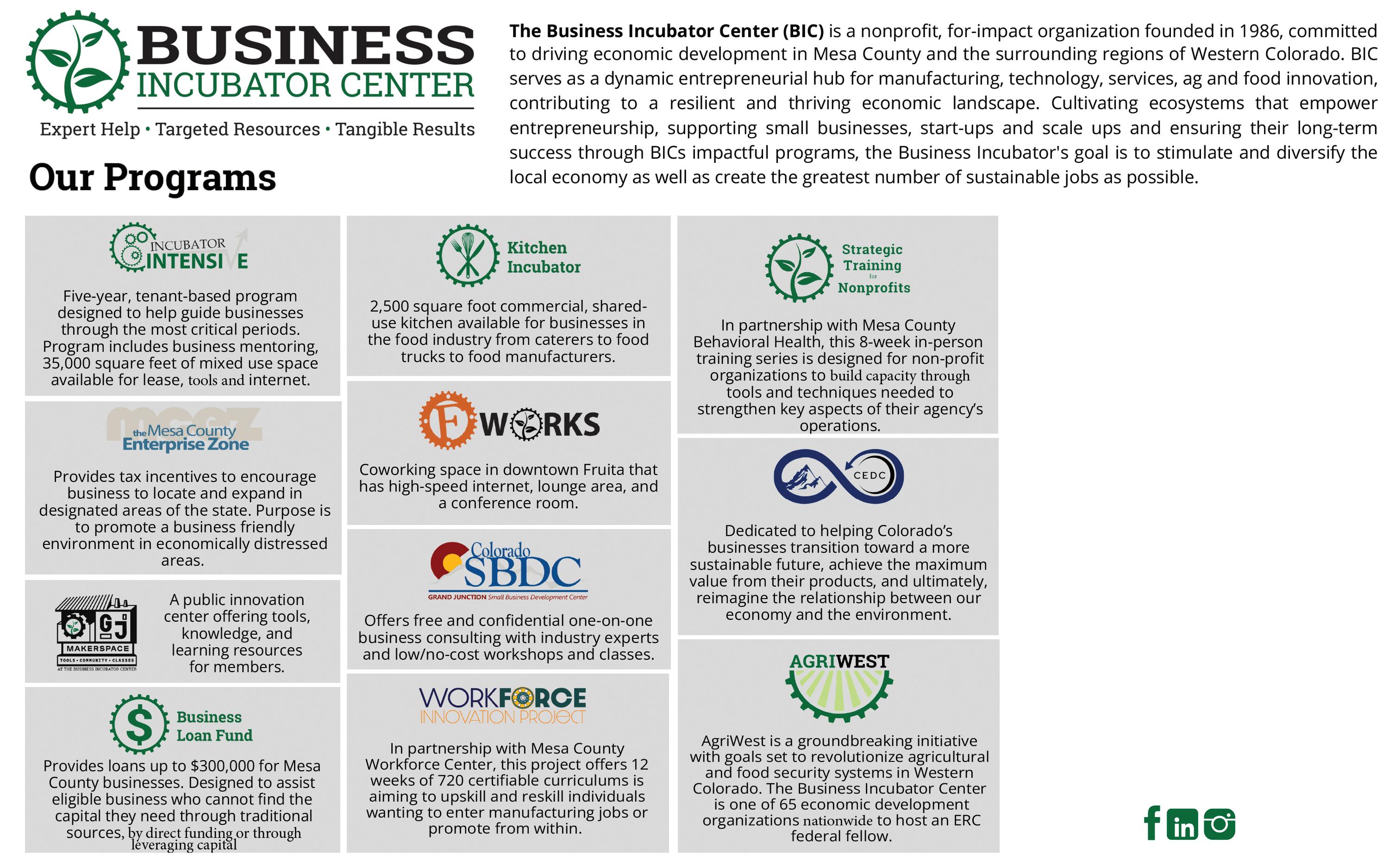In this issue
n You get a car! You get a car!
Red Rock Auto was driven to reward District 51 Foundation White Iced award winners with a car.

In this issue
n You get a car! You get a car!
Red Rock Auto was driven to reward District 51 Foundation White Iced award winners with a car.
4
n SparkLab launch, budding businesses
Homegrown Pathways looks to spark rural youth entrepreneurship with SparkLab launch.
5
n Local housing crisis addressed at summit
6
The Housing and Building Association of Western Colorado’s 2025 Housing Summit, brought together experts, developers and local government officials to address Mesa County’s ongoing housing crisis.
n Film Fest returns
The 2nd Annual GJ Jewish Film Festival will take place Feb. 15–16 at The Art Center on Seventh Avenue.
8
n Education for firsttime homebuyers
Stewart Cruickshank, sales manager of Bray & Co. Real Estate, gives tips for first-time homebuyers.



Aaron Badolato stands behind the case of doughnuts at Sweet
which opened in the
at 1410 North Ave. in Grand Junction in November. Badolato co-owns the doughnut shop
and Ari. They own three other Sweet Coloradough stores, including the original one, which
Badolato said his Sweet Coloradough stores have donated nearly 3 million doughnuts, and they try to bring smiles to customers’ faces. “If we can make people’s day better, hopefully they go out and make other people’s day better,” he said.

‘If somebody’s looking for the cheapest thing, that’ll never be us’
Sweet Coloradough’s doughnuts are hand-crafted. Nothing is automated. And it isn’t a minimum-wage shop. Employees are paid at least $25 per hour, and with that compensation comes an expectation of quality and customer service.
So, when co-owner Aaron Badolato talks about the cost of Sweet Coloradough’s doughnuts, he says they are $2 to $4 per doughnut (with discounts of 10 percent per half-dozen or 20 percent per dozen), and he doesn’t apologize.
“It’s never been about how to make a doughnut less expensive,” he said. “It’s always been a ‘strive to make it as good as possible’ and then charge a price where we can still stay in business.”
So, customers should understand that about Sweet Coloradough when they walk in the doors of its Grand Junction location, which opened in November at 1410 North Ave., the former home of a Daylight Donuts shop.
Initially Sweet Coloradough was open two days per week (Tuesday and Wednesday), and on Feb. 1 it became three days per week by adding Saturdays.
The Grand Junction doughnut shop is one of four Sweet Coloradough stores owned by Badolato’s family (wife Anne, daughters Lilli and Ari), with Glenwood Springs being home to the original one since 2013.

Co-owner Aaron Badolato stands next to a deep fryer full of doughnuts at Sweet Coloradough, 1410 North Ave. in Grand Junction. The store sells doughnuts, breakfast burritos and coffee, and Badolato said it will expand the menu once doughnut production can consistently meet the demand for quantity and quality. Then, he foresees offering foods such as pizza, sandwiches and ice cream.
Badolato said Grand Junction has “always been a place that we wanted to grow the business. It’s a beautiful part of the world, and I think that the demand is here, and the great people of Grand Junction deserve great doughnuts.”
Badolato said he had been a financial planner in Denver, then moved to Glenwood Springs to do the same kind of work, but he encountered an unanticipated dilemma: “When I moved to Glenwood, I couldn’t find a sandwich that I liked. I couldn’t find a doughnut I liked.”
He said he tried to persuade others to open a doughnut shop or deli, and he got no takers. So, it fell to him to provide what he wanted in Glenwood Springs, where the Sweet Coloradough store sells doughnuts and sandwiches.
“It’s just everything that I wanted. And then it turns out other people wanted it, too,” Badolato said.
The Grand Junction shop has breakfast burritos in addition to doughnuts, and Badolato said more menu options are likely to come later this year.
Before that happens, the Grand Junction store must master the doughnut production. That’s one of the reasons he didn’t opt to open the store six days per week from the start.
“Right now, our biggest focus is how to make enough doughnuts to be open each day,” Badolato said. “That’s the big seller, and then you get some breakfast burritos as well, and then start figuring out how to bring in the other savory (menu items). As soon as we can meet the demand and quality at the doughnut level, we’ll expand.”
But he won’t rush it. Badolato acknowledged Sweet Coloradough could be open every day right now, but it’s still figuring out how many doughnuts it needs to make to be open until 3 p.m. See DOUGHNUT on Page 10
With doughnuts priced at $2 to $4 per doughnut, Sweet Coloradough coowner Aaron Badolato knows that’s spendy. He also believes his doughnuts are worth every cent, because he did the math.
“Most of our four-dollar doughnuts usually cost about $2.80 to make,” he said. “So, after the 20 percent off (for a dozen doughnuts), everything’s roughly 20-to-35-cents-a-doughnut profit.
“It’s funny. I think a lot of people will see a four-dollar doughnut, and they’ll say, ‘Four dollars for a doughnut?’ But there’s no thought of how much it costs to make a four-dollar doughnut. Everyone, I think, assumes it’s a dollar to make a doughnut.”
Badolato said the largest cost is labor, followed by the ingredients.
“The cost of doing business now is probably seven times higher than it was 10 years ago,” Badolato said. “The cost structure, it’s always wild. It’s not how much money you make, it’s how much you get to keep. I think if I charge lower prices, then we’re out of business, it’s not good for anybody, right?”
He added Sweet Coloradough pays its employees a livable wage, and that’s “something we pride ourselves on. ... I would say with that comes an expectation of quality and expectation of great service. One of our main differentiators, I think, is providing a service level that’s in line with the quality of food. Great experiences with even better food.”
Pursuing Perfection
Badolato describes Sweet Coloradough’s doughnuts as “a hand-crafted, artisanal doughnut that is a labor of love. Nothing we do is automated or expedited to sacrifice quality.”
With the Glenwood Springs store open more than a decade, the recipes and processes are proven. But it’s never perfect, he said.
“It’s never, ‘Oh, we figured out how to make them great,’” he said. “It’s just every day it’s continuing that pursuit of greatness, but I don’t think it would be anything we would ever be able to tame, if you will. It’s just a constant strive for greatness that I don’t think could ever be achieved, but I think we’re on the right track.”
With the opening of Sweet Coloradough in Grand Junction, the Badolato family owns four locations. The others are in Glenwood Springs, Rifle and Eagle.
There were Sweet Coloradoughs in Carbondale, Snowmass and Aspen, but each was sold in recent years.
Badolato said he would like to develop a franchise model, perhaps by the end of this year, and have the ability to be in more places with different owners. He said he’d love to see Sweet Coloradough in Fruita and Palisade.
“I can only do so much, so try to spread the love through other people,” he said.
Sweet Coloradough is doing well in its infancy in Grand Junction.
“I would say better than we expected, and we had a high expectation,” Badolato said. “So it’s been phenomenal, great support from the community and definitely making us feel at home.”
Military Discount
Veterans and active military members get 10 percent off their doughnut purchase and a free cup of coffee.


Bookcliff Middle School teacher Ryan McLaughlin, left, listens to Red Rock Auto Group sales consultant Ryan Galarza tell him about the 2025 Nissan Leaf’s electric engine on Feb. 4 at the Red Rock Nissan auto dealership in Grand Junction. McLaughlin was one of six School District 51 staff members who received a White Iced Award from the District 51 Foundation on Feb. 1, then found out Red Rock Auto Group gifted each of them with a 2025 Nissan Leaf to drive for free on a two-year lease. Photo by Tim Harty.
Tim Harty The Business Times
You get a car! You get a car! You get a car! It wasn’t quite Oprah Winfrey’s famous scene circa 2004 when the popular daytime talk-show host gifted everyone in her studio audience a new car.
But Red Rock Auto Group on a smaller scale did something similar when it gifted new Nissan Leafs on two-year leases to six White Iced Award winners from School District 51.
The award winners – teachers Ryan McLaughlin (Bookcliff Middle School), Crystal Green (Palisade High School), Katie Hummel (Fruita Monument High School) and Joshua Lehman (Mount Garfield Middle School), counselor Janelle Gustafson (Orchard Avenue Elementary School) and kitchen manager Samantha Sidebottom (Central High School) –each received a small box with a bow on it when they were honored at the White Iced Celebration, hosted by the District 51 Foundation on Feb. 1.
Before opening his box, McLaughlin said he thought “this might be a gift card, maybe like an oil change.”
Instead, each box contained a key to a 2025 Nissan Leaf, an electric vehicle, which each will drive for free for two years.
Red Rock Auto Group Platform Manager Bryan Knight said the origin of the decision to provide such a gift goes back several years to fundraising activities and discussions with D51 Foundation Executive Director Angela Christensen.
“I was thinking one day: What’s something we could do that we could celebrate the winners?” said Knight, who manages each of Red Rock’s
Grand Junction dealerships, which include Nissan, Hyundai, Kia, GMC and Honda. “Everything we’d done in the past went to the foundation, which is fantastic, and we thought: What can we do, something special, for the (White Iced) winners? And we talked about this for the last couple of years, and we visited it and we pondered on it, and it just felt like this was the right year to do it.”
Past donations by Red Rock Auto Group to the D51 Foundation included a check for $104,600 in April 2023, a total netted from a promotion during which each car sale led to a $100 donation to the foundation in the car buyer’s name.
Christensen added the gift given this year to the six White Iced Award winners is “pretty unusual” and “exciting on another level.”
“This is just so wonderful to be able to do this for these very deserving White Iced Award recipients,” Christensen said. “We’re so appreciative to Red Rock Auto Group and what champions they’ve been for the D51 staff members and for the foundation.”
Knight said a variety of factors led to the choice of the Nissan Leaf as the vehicle it provided.
“We have a handful of them,” he said. “There’s some incentives through Colorado and the factory to lower the price point just a little bit. And plus, it’s just a fun car that people that have them say they’re fun to drive, they’re fast, they’re peppy.”
Knight added the Leaf introduces more people to the electric-vehicle market.
“We’re excited about it,” he said, “and just seeing the smiles on their faces. They work hard with the kids. They give a lot of time and their energy ... I think it’s a little bit of a thankless job, and we’re just lucky to have them. And this is just a small way we can give back and say thank you.”
This year was the 13th White Iced Celebration, and D51 Foundation Executive Director Angela Christensen said the foundation received nearly 100 nominations from District 51 staff members.
Because Red Rock Auto Group provided free use of a new car for two years to each of the six White Iced Award winners this year, Christensen thinks the number of nominations next year could skyrocket.
“I have to tell you, I’ve already started thinking: How many nominations am I going to get next year?” she said. “I think I’ll have to put a little disclaimer that says this was a one-time thing that I just couldn’t believe happened. And I don’t know if something like this would happen again.”
Red Rock Auto Group Platform Manager Bryan Knight couldn’t commit to providing new cars again, but he did say, “We’ll see what the future holds. We will continue to support District 51 Foundation along with District 51. And we want to be a big part, or I should say a small part, of what they do, and we’ll continue to work with them down the road. And who knows what it’ll be, but there’ll always be something.”

Brandon Leuallen The Business Times
In a bid to foster economic mobility and retain young entrepreneurial talent in rural Colorado, Homegrown Pathways has launched a program called Spark Labs to find and aid Western Slope youth with dreams of building their own businesses right in their home communities.
Colin Lacy, founder and CEO of Homegrown Pathways, grew up on the Western Slope and graduated from Ridgway High School. He shared that he personally has seen many friends and family members who would have liked to stay in the area but left for economic reasons, potentially missing out on opportunities to either work with high-quality, local companies or to start their own business in the area.
“We need to create more intentional pathways,” he said.
Lacy said many companies in the region, both startups and larger businesses, are struggling to fill roles. He started Homegrown Pathways to connect workforce needs with local talent to address those gaps and drive economic mobility for young people.
In addition to connecting local talent with existing businesses, Lacy and his team saw an opportunity to reach youth with an entrepreneurial spirit. That’s where Spark Lab comes in.
“Spark Lab is the pilot that’s focused on those entrepreneurial pathways and ultimately building a local workforce that has an entrepreneurial mindset as well,” Lacy said.
Homegrown Pathways secured $300,000 in federal and private funding, including AmeriCorps planning grants and support from Denver-area donors. This funding supports the program’s staff and initiatives, including the Spark Lab pilot program.
Spark Lab partners with Startup Colorado to offer a nontechnical pre-accelerator for young entrepreneurs. The pilot program recently concluded with a pitch event where $10,000 in seed funding was awarded to 12 rural innovators aged 15 to 19 years old.
“We’re really excited with the success of the first pilot,” Lacy said. “The participants developed their business ideas and built social capital with local entrepreneurs.”
The young entrepreneurs hail from Mesa, Delta, Montrose, and Ouray counties, representing a diverse range of business concepts.
“One-hundred percent of the participants said they would recommend the program
to a friend,” Lacy said. “They also reported significant advancements in their businesses and skill development.”
The program’s success has attracted support from the Morgridge Family Foundation, which provided the seed funding for the pilot program.
Among the 12 businesses that received seed funding were the following four recipients: Aspire to Inspire
Jizelle Cisneros-Muniz of Grand Junction started Aspire to Inspire, a nonprofit dedicated to helping unemployed individuals find purpose and career opportunities through community-based work. Aspire to Inspire was awarded $750 in seed funding, with $550 supporting nonprofit leadership and grantwriting courses and $200 covering a 12-month Squarespace subscription.
Cash Thomas, Evan Eddy and Luke Robertson from Olathe started Jackaroo, a landscaping and handyman business with a passion for community and quality service.
Jackaroo received $1,500 for professional development opportunities and to expand across multiple locations with Olathe as its headquarters, along with a special Citizens State Bank Financial Consulting Package to support long-term business growth.
Swxxtcreations
Monserrat (Monse) Perez from Olathe started Swxxtcreations to specialize in crafting custom-designed, chocolate-covered strawberries and other unique desserts. Swxxtcreations received $1,500 in seed funding, allowing Monse to invest in essential tools, equipment, professional development and marketing to expand her business.
You can find Swxxtcreations on Instagram! @swxxtcreations
Neva Hines, a student at Ridgway Secondary School, started CareerMe as a platform that helps companies efficiently recruit, hire and train high school students for key internship roles. CareerMe was awarded $900 to fund UI/UX design courses and cover an all-expenses-paid trip to West Slope Startup Week, where Hines will expand her network as Startup Colorado’s youth ambassador.
Homegrown Pathways invites others in the community and beyond to get involved and support efforts to retain and empower the next generation of business leaders. For more information, visit homegrownpathways.org.
F






Brandon Leuallen The Business Times
Lack of inventory. Rising interest rates. New state and local regulations. Increased fees. Inefficiencies within planning departments. Down-payment assistance.
Those were several of the key issues discussed Feb. 6 at the Housing and Building Association of Western Colorado’s 2025 Housing Summit, hosted by Colorado Mesa University, that brought together experts, developers and local government officials to address Mesa County’s ongoing housing crisis.
Kicking off the event Kevin Bray, president of the Home Builders Association of Western Colorado, outlined the economic challenges that have exacerbated the housing shortage. Bray said current costs are still being affected by the handling of the COVID-19 pandemic, noting the federal government’s printing of money contributed to inflation, which the Federal Reserve then countered with high interest rates.
Bray said housing inventory is a primary factor in high costs of housing locally as migration into Mesa County is outpacing housing inventory. He said personal incomes have increased, but they have not kept up with housing costs.
“Incomes have increased by 20 percent, buying power went down by 25 percent,” Bray said.
Bray displayed charts showing the number of available lots is insufficient to meet the demand for housing, while building-permit activity is also declining.
“We’ve been underbuilding for quite a long time,” he said.
Bray stressed the importance of increasing lot inventory before homes can be constructed. The presentation revealed Mesa County has 1,200 existing lots, but fewer than 900 are expected to come online, with approval timelines stretching 12 to 18 months.
“The City of Grand Junction is reporting a 70 percent reduction in applications. We will see the effects of that in 2026,” Bray said. Challenges in Housing Development
Bray highlighted how rising construction costs, including materials, new regulations and increasing fees, are making housing less affordable.
He said recent regulations, such as Colorado’s energy codes and the City of Grand Junction’s updated Transportation Engineering Design Standards — primarily for bike and pedestrian infrastructure — have significantly increased local costs. Additionally, impact fees are expected to increase, following the completion of the Grand Junction’s current impact-fee study.
Bray said increased costs will impact existing homeowners as well as new construction.
“In a tight inventory market, resale homes are going to follow new construction,” he said. “They’re going to follow it tighter. The tighter the inventory is, which means when new construction costs more, the resale market is going to follow that, and that’s going to cost more to everyone.”
Bray concluded by urging local collaboration
“This is a supply problem,” he said. “If there’s one thing that I would hope that the community would take a serious look at, (it) is the affordability gap. This is really a great community, and I think we need to have a collaborative approach. We need to be together, and we need to aggressively pursue this issue. And that would be my hope that you all take away.”
Colorado Housing Affordability
DJ Summers, director of research for the Common Sense Institute, shed light on the broader housing trends in Colorado, emphasizing housing affordability is a growing problem.
“The only state that is less competitive when it comes to housing is Hawaii,” Summers said.
Summers said home prices have doubled or even tripled in some areas, but wages have not kept pace. In Mesa County in 2013, it took 43 hours of work at the average wage to afford the average mortgage. By 2023, that number increased to 103 hours of work.
Summers added Colorado’s migration patterns are shifting.
“International migration has outpaced domestic migration, and we’re facing a housing shortage of 150,000 units statewide,” he said.
Mesa County alone is short about 1,421 housing units, contributing to the uphill battle against rising costs.
Local Efforts to Address Housing Crisis Panel discussions during the summit highlighted local efforts to combat the crisis with varying strategies for addressing affordability and availability.
Charlie Getchter, builder and founder of BOA Builders, discussed the challenges developers face in light of rising costs.
“If we have a housing crisis, why are we increasing fees instead of reducing them?” Getchter asked. “Policies that increase costs for developers only get passed down to homebuyers.”
Nate Porter, founder of Porter Homes, agreed and pointed out regulations and planning-department delays add significant challenges to building affordable housing.
“It takes a lot longer to go through the process, and time is money,” he said.
Emilee Powell, executive director of Housing Resources of Western Colorado, said nonprofits face additional challenges.
“Funding sources are oversubscribed, and we can’t rely on the federal or state level to fix this,” she said. “We have to get creative locally to provide affordable housing options.”
Local Officials Address Challenges
Fruita City Manager Shannon Vassen highlighted his city’s efforts to increase subsidized housing inventory, streamline housing processes and create more opportunities for development.
“We created a housing authority in 2022 and have streamlined many processes, making it easier for developers to get projects done,” Vassen said. “We’re always looking for ways to improve efficiency.”
Vassen said the City of Fruita delays the collection of impact fees until the certificate of occupancy, allowing developers to reduce costs during the construction process and pay the fees after the home is sold, rather than up front.





The Second Annual Grand Junction Jewish Film Festival will take place Feb. 15–16 at The Art Center on Seventh Avenue and showcase exceptional films that explore Jewish culture, history and resilience, fostering understanding and connection.
“No Name Restaurant” will screen Feb. 15. Set in Alexandria, Egypt, the film tells the heartwarming story of Ben, an ultra-Orthodox Brooklyn Jew, and Adel, a Bedouin, as they embark on an unlikely journey to save a synagogue and its community during Pesach. Through challenges in the unforgiving Sinai Desert, their mission becomes a tale of survival, compassion and shared humanity.
“SHTTL” will screen Feb. 16. This story is set in a Yiddish Ukrainian village on the eve of the Nazi invasion in 1941. Filmed on a meticulously reconstructed Shtetl outside Kyiv, the film is a tribute to a lost world and a vivid portrayal of a community forever changed by history. The set, originally intended to become a museum, was destroyed during the ongoing conflict in Ukraine, adding deeper meaning to this haunting and beautifully crafted film.
“The Grand Junction Jewish Film Festival is about creating an experience that sparks conversation, deepens understanding, and brings people together,” said Dalida Sassoon Bollig, co-founder of the Grand Junction Jewish Film Festival. “This festival is for everyone in the Grand Valley who values storytelling, history and culture. Our goal is to make these films a gateway to connection, a way to engage with ideas and an opportunity to celebrate the richness of Jewish heritage within the broader fabric of our community.”
Seating is limited, and tickets are available now at gjjewishfilmfestival.com.
The festival’s success is made possible through the support of individuals, businesses, and organizations who share its mission to celebrate Jewish culture and foster meaningful dialogue. Sponsorship opportunities are available, offering a chance to support this cultural cornerstone and ensure its continued growth and impact.
Kickstart your 2025 with our 6-Week Goal Accelerator & Accountability Program (GAAP)
Designed for entrepreneurs and creators, GAAP helps you overcome distractions and transform your dreams into reality. It keeps you focused and motivated as you scale your business, launch projects, or push personal limits. For just $25 a week, you will get: Crystal-clear, actionable goals that resonate with your vision and values.
Weekly check-ins to ensure accountability and gain immediate insights.
Support from fellow entrepreneurs and creators who truly understand your journey.
Empowering coaching and a high-octane program designed to shatter barriers and propel your progress.
STATE OF BUSINESS
Make this YOUR breakthrough year! First GAAP group starts 2/3/25! Email GAAP@higherstateofbeing.com for details and secure your spot— spaces are limited!
Take the first step now and make your goals happen this year!






Continued from Page 2
On Saturday, Feb. 1, Sweet Coloradough made 9,000 doughnuts, and when the shop closed at 3:30 p.m., 14 doughnuts remained and were donated to a food bank.
“It’s one thing to be open every day. It’s another thing to be open with enough product,” he said. “Satisfying the people that do come in later in the day, that’s the goal now. I want everyone to have a doughnut until four in the afternoon or six in the evening, as opposed to you come at 8:30 a.m. and there’s 100 doughnuts left.
“We’re striving to provide enough quantity and quality to meet the demand. One of the saddest things we face is, you know, that family of six, getting out of their car and coming to the door and it’s closed. We understand that and are working our best to meet that, but I think getting those hours out there – Tuesday, Wednesday, Saturday, and then we’ll probably add ideally Friday down the road – I think that takes care of what I need.”
All the while, the quality of the doughnuts must not suffer. That’s nonnegotiable.
“I would never eat a grocery store doughnut, because I don’t like it,” Badolato said. “Something that I pride myself on is I’ll only serve it to you if I’m gonna eat it. So, the idea that we’re gonna try to figure out how to make it cheaper just would never happen. I think the only thing we’ll try to do is continue to make it better. And hopefully we can get there.
“And if somebody’s looking for the cheapest thing, that’ll never be us.”
F

Continued from Page 6
Grand Junction City Manager Mike Bennett, who was previously Fruita’s city manager, emphasized the importance of adaptability and collaboration.
“I’ve learned early in my career you’ve got to listen to the people that are closest to the work. We need to find new solutions to housing problems, as the old ones aren’t working anymore,” Bennett said, while also expressing frustration that the only affordable housing being developed is subsidized.
Addressing impact fees, Bennett said he doesn’t personally like them, but the city cannot fund infrastructure through sales-tax revenue alone. Without the fees, the city would need other funding sources to support growth. He contrasted the situation with Montrose, which has no impact fee for recreation but has passed multiple bonds to fund parks and recreation.
Mesa County Administrator Todd Hollenbeck said the county is addressing housing challenges by working on improving efficiency.
“We’re looking at using technology to streamline services,” he said.
Hollenbeck said the county set up Starlink on county vehicles to get real-time data in the field, and it hopes one day to have an AI system that can expedite the process.
Hollenbeck addressed fees and regulations from the county’s perspective, saying, “We’ve kept fees low and haven’t increased fees since 2018.”
Hollenbeck drew applause from the crowd when he summed up his thoughts by saying, “The simple answer is to remove red tape and regulation and streamline.” Role of Employers in Solutions
Another panel discussion addressed the impact of housing on businesses and employees. Andrew Golike, plant manager for Coorstek, shared how the company has had to adapt to the housing shortage.
“Flexibility is key when employees are struggling to find homes,” Golike said. “Some of our employees have had to temporarily park campers or look for roommates to make ends meet.”
Amy Jordan, chief human resources officer at Community Hospital, discussed the difficulty of recruiting employees when affordable housing is scarce.
“We’re seeing stress on our recruitment efforts, especially for families looking for homes with yards for pets,” Jordan said. “Relocation assistance and down payment programs are critical for us to keep talent in the area.”
District 51 School Board President Andrea Haitz said housing affordability is not often cited in interview or exit surveys as a primary reason for teachers leaving or not joining the district. She attributed this to the district’s efforts to increase teacher pay and collaborate with the housing authority on a down-payment-assistance program.
However, she emphasized the types of housing being built can affect student enrollment. Referring to a chart presented earlier, Haitz said about 75 percent of in-migration to Mesa County involved individuals without children under 18 years old.
“According to the demographer, apartments yield 0.12 kids per unit, single-family homes yield 0.42 kids per unit, and mobile homes yield 1 child per unit,” Haitz said.
F






Becoming a homeowner is one of the most significant milestones in life. It’s a moment filled with excitement, anticipation and, for many, a touch of anxiety.

Stewart Cruickshank
For first-time homebuyers, navigating the real estate market can feel overwhelming, but with proper education and preparation, the process can be smooth and rewarding. Here are just some of the things you should know.
Before you even start looking at homes, start by looking at your finances: your monthly income, expenses and savings. Then, check your credit score. It is a great way to see what the journey ahead may look like. A higher credit score can be beneficial, and a lower score can be detrimental.
Some loans allow for as little down as possible, but saving more can lower your monthly payments and help eliminate the need for private mortgage insurance (PMI).
Many local banks and credit unions offer first-time homebuyer programs with financial counseling and favorable loan terms. Getting pre-approved with a trusted mortgage lender will give you a clear understanding of your budget and shows sellers you’re a serious buyer. They will also help you explore different loan options and choose the one that best fits your needs.
Knowing the market and conditions can help you see the bigger picture. Tools like online property-search platforms and local real estate reports can provide valuable insights into prices, neighborhoods, lifestyle and budget.
Partnering with an experienced real estate agent is one of the smartest moves a first-time buyer can make. Your real estate agent is your trusted advisor, guiding you through the entire process, from property searches to closing, negotiating on your behalf to get the best deal, providing insights into the local market and connecting you with trusted professionals, such as inspectors and appraisers.
At Bray & Company, our agents specialize in helping first-time buyers. We understand the unique challenges you face and are here to answer your questions every step of the way.

The journey to homeownership takes time. Be prepared for potential hurdles, such as bidding wars or delayed closing dates. Staying patient and flexible will help you navigate these challenges without losing sight of your ultimate goal.
Buying your first home is a monumental achievement, and it’s worth taking the time to do it right. By focusing on financial planning, working with knowledgeable professionals and taking advantage of available resources, first-time buyers can feel confident and empowered throughout the process.
If you’re ready to take the first step, Bray & Company is here to help. Our team is committed to making your home-buying experience seamless and enjoyable. Contact us today to learn more about how we can guide you on your journey to homeownership.
Stewart Cruickshank is sales manager of Bray & Co. Real Estate in Grand Junction. For more information, call 242-3267 or visit www.brayandco.com.

Community Hospital will be the 2025 title sponsor for the Banff Centre Mountain Film Festival World Tour, hosted by the Rotary Club of Grand Junction.
“Our complete focus is on the well-being of our community, and supporting Banff and the film festival beneficiaries such as COPMOBA, the Colorado Canyon Association, Western Colorado Conservation Corps and more directly ties into our mission,” said Chris Thomas, president and CEO of Community Hospital.
The Rotary Club of Grand Junction released the film lineups on the official Banff website, Banff-gj.com, for the four-night festival, which begins Feb. 12 at the CMU Asteria Theater, runs Feb. 13-14 at the Historic Avalon Theatre and ends on Feb. 15 at the Egyptian Theater in Delta.
From the over 400 entries submitted to the festival each year, award-winners and audience favorites are among the films that are selected to play in theaters worldwide.
On. Feb. 14, the film “2 Legs is 2 Easy” will be shown about Roaring Fork Valley’s Steve Karczewski, who was born with bone cancer in his left leg and has never known what it is like to have two legs, but that hasn’t prevented him from doing anything and everything he’s ever wanted as an outdoor athlete.
This year’s festival beneficiaries are COPMOBA, the Colorado Canyon Association, Colorado Mesa University International Student and Outdoor Program, the Colorado National Monument Association, and Western Colorado Conservation Corps.
Other sponsors include News Channel 5, Thomas Hunn Jewelers, Handlebar Tap House, Isagenix, Atlasta Solar Center, Bank of the San Juans, Sharon M. Woodward, Pat Tucker, The Colorado Office of Film, Television and Media, The Downtown Hotels, KNZZ, 92.9 The Moose, 1039 The Planet and Magic 93.1.
For tickets and information, visit Banff-gj.com or contact Barb Bowman at 970-261-1052.





























Legacy
All Copy Products/ Verticomm
Anna Rickenbach RE/MAX 4000
Canvas Credit Union
Dynamic Program Management
EC Electric, Inc.
Grand Junction Chrysler, Dodge, Jeep, and Ram
High Country Beverage
Highline Internet
Hilltop Community Resources, Inc.
Intermountain Health/St. Mary's
Regional Hospital
MOD Pizza
Rocky Mountain Health Plans a UnitedHealthcare Company
Student Transportation of America, Inc.
Swire Coca-Cola, USA
Timberline Bank
Trane
The Christi Reece Group, as part of its Circle Fund, awarded $7,000 to the Grand Mesa Nordic Council-Skyway Shelter Capital Campaign, $2,500 to The Gift of Love, and $1,500 each to the Grand Rivers Humane Society, Grand Valley Dancers Foundation and Rocky Mountain Down Syndrome Association-Western Slope.
Every quarter, the Grand Valley real estate company donates 2 percent of its earnings to local nonprofits. Nominations are provided by the community via The Christi Reece Group’s Facebook and Instagram pages, then its real estate clients vote to choose the quarterly recipients of The Circle Fund. Since its inception in 2019, The Circle Fund has contributed $421,000 to local nonprofits.
“It was great to give to five diverse local organizations this quarter,” Christi Reece said. “The Grand Mesa Nordic Council is almost across the finish line for their capital campaign, it was wonderful that our clients voted to give them a boost towards that goal!” Visit www.christireece.com/thecirclefund for more information.
Individuals and families interested in applying for the chance to own a Habitat for Humanity of Mesa County home can begin the application process.
Applicants must be Mesa County residents within 30 to 80 percent of the area median income. They must demonstrate need for housing and the ability to repay an affordable mortgage, and they must partner with Habitat by completing required “sweat equity” hours.
The application deadline is March 3. For more information, visit HabitatMesa.org or contact 970-255-9850.













r t F r a z h o E l s e a n d D a n P r n s e r F i d e l i t y M o r g a g e - A l l e n C o o m b s G r a n d M e s a M e c h a n i c a n c G r a n d V a l e y B a n k H C L E n g n e e r n g & S u r v e y i n g L L C H o m e L o a n S t a e B a n k H o m e L o a n I n s u r a n c e L n d a u e r D u n n I n c S t r u c t u r a l E n g n e e r s L O N G B u l d n g T
g a s D e c k e r D S e a n a n d K r s i n L y n c h D r T e y e n a n d M r s M c h e e S h a o E l t e E v e n t s G J T e c h C e n e r L L C G r a n d V a l e y A u o S a e s G a n d J u n c t o n F e d e r a l C r e d t U n o n G r z E n e r





























